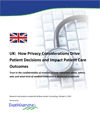
The survey was conducted using an online platform. Survey invitations were sent to more than 9,349 patients across the United Kingdom. Invitations to participate were sent to residents of England, Scotland, Wales, and Northern Ireland. The survey resulted in responses from participants of varying race, educational level, economic class, age and gender. The survey invitation resulted in participation of 1001 respondents.
Download: How Privacy Considerations Drive Patient Decisions and Impact Patient Care Outcomes (.pdf, 853 KB).
Download from eHealthNews.eu Portal's mirror: How Privacy Considerations Drive Patient Decisions and Impact Patient Care Outcomes (.pdf, 853 KB).
Related news article: